This article was co-authored by Tu Anh Vu, DMD. Dr. Tu Anh Vu is a board certified dentist who runs her private practice, Tu's Dental, in Brooklyn, New York. Dr. Vu helps adults and kids of all ages get over their anxiety with dental phobia. Dr. Vu has conducted research related to finding the cure for Kaposi Sarcoma cancer and has presented her research at the Hinman Meeting in Memphis. She received her undergraduate degree from Bryn Mawr College and a DMD from the University of Pennsylvania School of Dental Medicine.
There are 11 references cited in this article, which can be found at the bottom of the page.
wikiHow marks an article as reader-approved once it receives enough positive feedback. In this case, 100% of readers who voted found the article helpful, earning it our reader-approved status.
This article has been viewed 251,630 times.
Experts note that if you have tooth or jaw pain that hurts more when you chew or eat, you may have a tooth infection.[1] A tooth infection, or an abscess, happens when bacteria enters you tooth's inner pulp and infects the root or the gums. Studies show that abscesses can not only cause pain, but they can be life-threatening if the infection spreads to other parts of your body.[2] If you suspect you may have an infected tooth, make an appointment with your dentist right away.
Steps
Monitoring Tooth Pain
-
1Monitor any toothache that you feel. An infected tooth can cause mild to severe pain in that area, depending on how infected the tooth is. The pain is generally continuous and sharp. Some dentists describe it as a shooting, throbbing, or gnawing type of pain. This pain will radiate upwards and downwards along the side of your face to places like your ear, jaw or head.[3]
- Keep in mind that in many cases, dental infections are asymptomatic, so you may not experience any tooth pain even if you do have an infection. However, if the infection gets really bad, you might have extreme pain, swelling, or pus.[4]
- Your dentist will tap your teeth with a dental probe. If you have an abscess, you will feel pain when the infected tooth is tapped — what the Merck Manual describes as “exquisite” sensitivity.[5] — or when you bite down.
- Keep in mind that if your infection is severe, you will most likely be unable to pinpoint the exact tooth causing the pain because the whole area around the tooth will also feel painful. Your dentist will need to take x-rays to identify which tooth is infected.
- If the infection destroys the pulp at the root of the tooth — the "heart" of the tooth — the pain may stop because your tooth has died; however, this does not mean that the infection will stop. It will continue to spread and destroy other tissue and bone.
-
2Pay attention to dental sensitivity. Some amount of sensitivity to hot and cold is normal in teeth. This is caused by small holes in the enamel called “caries” and often doesn’t require special treatment;[6] however, an infected tooth becomes very sensitive to hot and cold substances. For instance, you will most likely experience severe pain if you eat a hot bowl of soup — a shooting pain that lingers after you have stopped eating.[7]
- Aside from hot and cold, you might also experience pain when you eat sweet products, as the sugar can irritate the infected tooth and create pain.
- All of these repeated sensations may affect the pulp and inflame the entire system of vessels and nerves. In most cases this damage is irreversible and you will need to have a root canal.
Advertisement -
3Watch for pain while eating. Chewing may also be painful when you have an abscessed tooth, particularly with solid foods. Biting or chewing applies pressure to your tooth and jaw and can cause pain. This pain may linger even after you stop eating.[8]
- Keep in mind that there can be other causes of pain in the teeth or jaw while chewing. It does not always mean that you have a tooth infection. For example, sometimes people internalize stress and clench their jaw muscles, which can lead to very similar kinds of pain. This is a “Temporomandibular joint and muscle disorder.”[9]
- Some people also grind or clench their teeth when they sleep, which is known as bruxism.[10]
- Sinus or ear infections may also cause discomfort like a toothache, but these usually feature a headache. One symptom of heart disease, as well, is tooth and jaw pain. No matter what it turns out to be, you should take the pain seriously and see a dentist.
Recognizing Other Symptoms
-
1Look for swelling or discharge of pus. Check to see if the gums around your tooth have become red, swollen, and sensitive. You may notice a gum boil, a pimple-like formation on the gum near the infected tooth and up to the root. You may also be able to see white pus in the sore or around the tooth — the pus is actually what causes the pain because it puts pressure on your tooth and gums. When the pus begins to drain, your pain will subside some.[11]
- Bad breath or a foul taste in your mouth is another give away. This is directly related to the build-up of pus. If your tooth is severely infected, pus may begin to drain from the tooth or from a gum-boil into your mouth. It may happen suddenly, in a rupture of the abscess, and it will taste metallic or sour. It will also smell bad. Avoid swallowing the pus.
-
2Note any tooth discoloration. An infected tooth can change in color from a yellow to a dark brown or grey color. This change is caused by the death of the pulp inside of your tooth, namely a “bruising” from dying blood cells. The dead pulp will emit toxic products, like anything that decays, that will reach up to the surface of your tooth through the porous passageways in your tooth.[12]
-
3Check for swollen neck glands. A tooth infection may well spread to adjoining areas of the body, especially if you have let it go untreated. For example, the infection can affect your jaw, sinuses, or the lymph glands under your jaw or in your neck. These latter may swell, feel tender, or be too painful to touch.[13]
- While any tooth abscess is serious and needs treatment, please seek medical attention immediately if you have an infection that spreads. Because it is close to vital organs — notably your brain — such an infection can easily become life-threatening.
-
4Beware of fever. Your body can react to an infection by raising your internal body temperature, causing you to run a fever.[14] Normal body temperature can range from 97 to 99°F (36.1 to 37.2°C). A fever is usually a reading over 100.4°F (38°C).[15]
- Along with fever, you may also develop chills, headache, or a feeling of nausea. You may feel weak and become dehydrated, so be sure to drink water.
- Seek medical attention if your fever continues to rise or does not respond to medication, or if you run a temperature of over 103°F (39.4°C) for several days.
Expert Q&A
-
QuestionWhat should I do if a tooth beside an extracted tooth begins to hurt?
 Cristian Macau, DDSDr. Macau is an oral surgeon, periodontist, and aesthetician at Favero Dental Clinic in London. He received his DDS from Carol Davila University of Medicine in 2015.
Cristian Macau, DDSDr. Macau is an oral surgeon, periodontist, and aesthetician at Favero Dental Clinic in London. He received his DDS from Carol Davila University of Medicine in 2015.
Doctor of Dental Surgery Avoid cold food and drinks and make sure the tooth has not been chipped or broken during the extraction. The cause may be a passing sensitivity created by the retraction of the gums while the extraction site is healing. Consult your dentist about the problem and start using a desensitizing toothpaste.
Avoid cold food and drinks and make sure the tooth has not been chipped or broken during the extraction. The cause may be a passing sensitivity created by the retraction of the gums while the extraction site is healing. Consult your dentist about the problem and start using a desensitizing toothpaste. -
QuestionWhy did my dentist said an x-ray will not show the infection of my root canal tooth?
 Cristian Macau, DDSDr. Macau is an oral surgeon, periodontist, and aesthetician at Favero Dental Clinic in London. He received his DDS from Carol Davila University of Medicine in 2015.
Cristian Macau, DDSDr. Macau is an oral surgeon, periodontist, and aesthetician at Favero Dental Clinic in London. He received his DDS from Carol Davila University of Medicine in 2015.
Doctor of Dental Surgery An x-ray will never show you a difference between a healthy pulp or a pulp that has infection. Instead, you can see if there is any reaction of the pulp at the end of the root affecting the apical bone or if there is any cavity which is close to the pulp and infiltrated with bacteria the pulp chamber.
An x-ray will never show you a difference between a healthy pulp or a pulp that has infection. Instead, you can see if there is any reaction of the pulp at the end of the root affecting the apical bone or if there is any cavity which is close to the pulp and infiltrated with bacteria the pulp chamber. -
QuestionHow do I know if I have an infected tooth?
 Tu Anh Vu, DMDDr. Tu Anh Vu is a board certified dentist who runs her private practice, Tu's Dental, in Brooklyn, New York. Dr. Vu helps adults and kids of all ages get over their anxiety with dental phobia. Dr. Vu has conducted research related to finding the cure for Kaposi Sarcoma cancer and has presented her research at the Hinman Meeting in Memphis. She received her undergraduate degree from Bryn Mawr College and a DMD from the University of Pennsylvania School of Dental Medicine.
Tu Anh Vu, DMDDr. Tu Anh Vu is a board certified dentist who runs her private practice, Tu's Dental, in Brooklyn, New York. Dr. Vu helps adults and kids of all ages get over their anxiety with dental phobia. Dr. Vu has conducted research related to finding the cure for Kaposi Sarcoma cancer and has presented her research at the Hinman Meeting in Memphis. She received her undergraduate degree from Bryn Mawr College and a DMD from the University of Pennsylvania School of Dental Medicine.
Board Certified Dentist An infected tooth can only be diagnosed by a dental professional, with X-rays and a clinical exam. It's recommended that you see your dentist every 6 months for an exam and cleaning and to make sure you don't have any active infections, because many dental infections or asymptomatic. However, if an infection gets really bad, you might have extreme pain, swelling, or pus.
An infected tooth can only be diagnosed by a dental professional, with X-rays and a clinical exam. It's recommended that you see your dentist every 6 months for an exam and cleaning and to make sure you don't have any active infections, because many dental infections or asymptomatic. However, if an infection gets really bad, you might have extreme pain, swelling, or pus.
Warnings
- If you're suffering from tooth pain or you believe you have an infected tooth, see your dental professional for treatment as soon as you can.[17]⧼thumbs_response⧽
References
- ↑ https://www.mouthhealthy.org/en/az-topics/a/abscess
- ↑ https://my.clevelandclinic.org/health/diseases/10943-abscessed-tooth
- ↑ https://www.nhs.uk/conditions/dental-abscess/
- ↑ Tu Anh Vu, DMD. Dentist. Personal interview. 7 May 2020.
- ↑ http://www.merckmanuals.com/professional/dental-disorders/symptoms-of-dental-and-oral-disorders/toothache-and-infection
- ↑ http://www.merckmanuals.com/professional/dental-disorders/symptoms-of-dental-and-oral-disorders/toothache-and-infection
- ↑ https://www.nhs.uk/conditions/dental-abscess/
- ↑ https://www.nhsinform.scot/illnesses-and-conditions/mouth/toothache
- ↑ https://my.clevelandclinic.org/health/diseases/15066-temporomandibular-disorders-tmd-overview
- ↑ https://www.hopkinsmedicine.org/health/conditions-and-diseases/bruxism
- ↑ https://my.clevelandclinic.org/health/diseases/10943-abscessed-tooth
- ↑ https://emedicine.medscape.com/article/1076389-clinical
- ↑ https://my.clevelandclinic.org/health/diseases/10943-abscessed-tooth
- ↑ https://www.merckmanuals.com/professional/dental-disorders/symptoms-of-dental-and-oral-disorders/toothache-and-infection
- ↑ https://my.clevelandclinic.org/health/symptoms/10880-fever
- ↑ Tu Anh Vu, DMD. Dentist. Personal interview. 7 May 2020.
- ↑ Tu Anh Vu, DMD. Dentist. Personal interview. 7 May 2020.
About This Article
To know if you have an infected tooth, check for sustained and stabbing pain from the affected area. You may also have sensitivity to hot and cold, as well as sweet, sugary foods. Along with pain and sensitivity, you may notice swollen gums, and bad breath or a foul taste in your mouth. If you have any of these symptoms, make an appointment with your dentist to get the infection treated. For tips from our Dental co-author on how to tell if a tooth has died, read on!
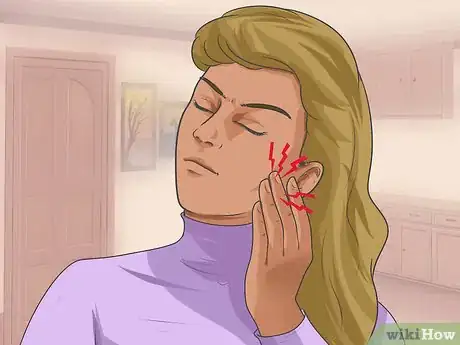


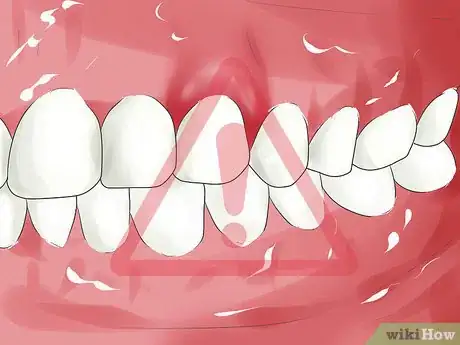
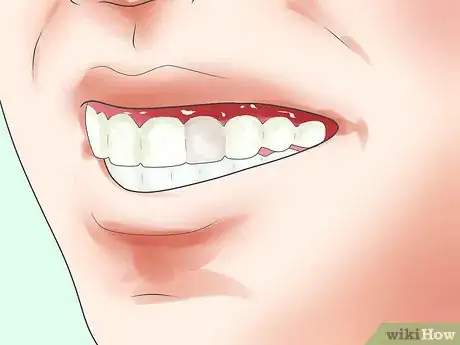


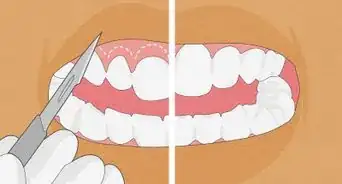
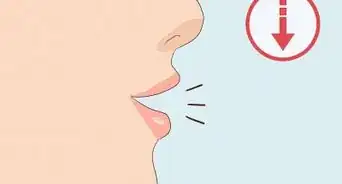
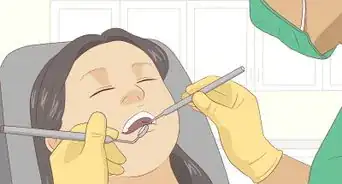
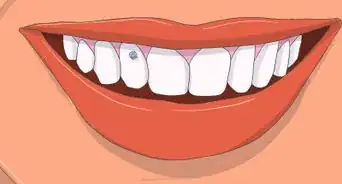
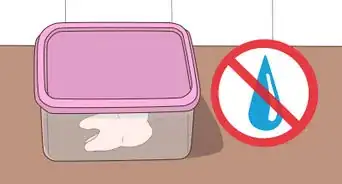
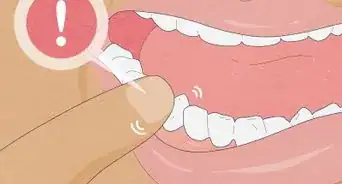


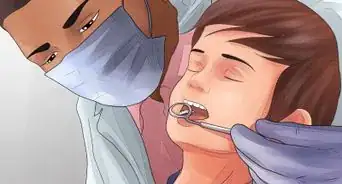















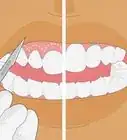
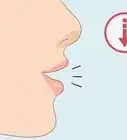
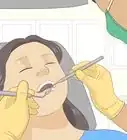





































Medical Disclaimer
The content of this article is not intended to be a substitute for professional medical advice, examination, diagnosis, or treatment. You should always contact your doctor or other qualified healthcare professional before starting, changing, or stopping any kind of health treatment.
Read More...